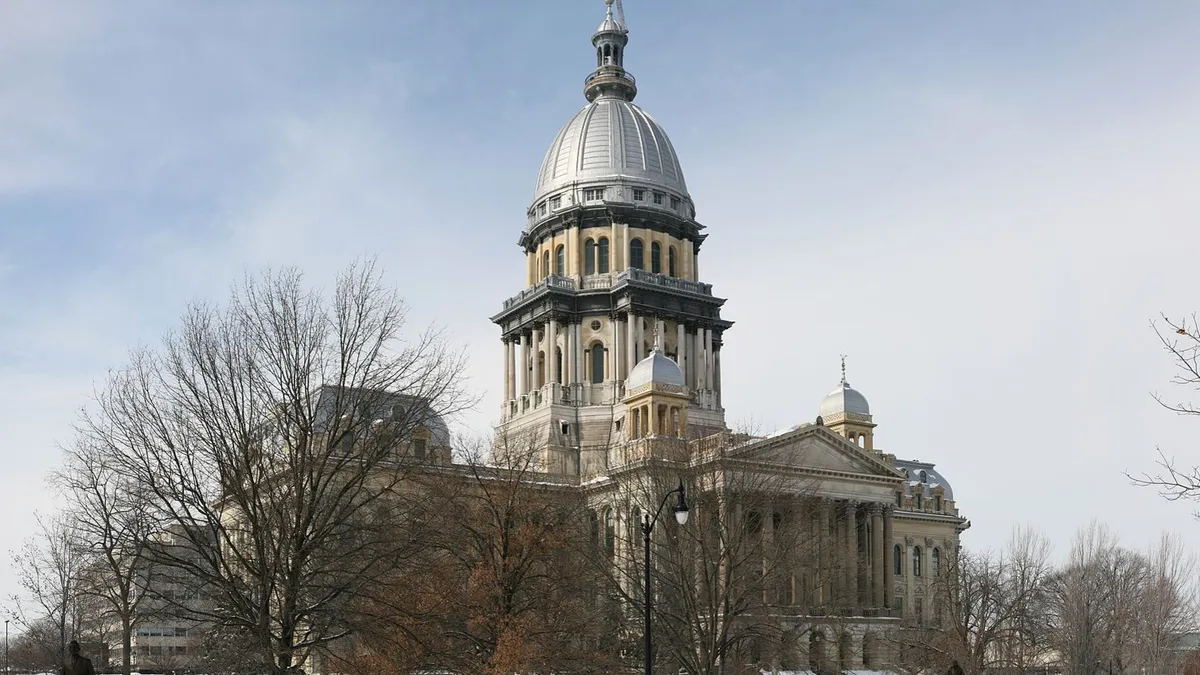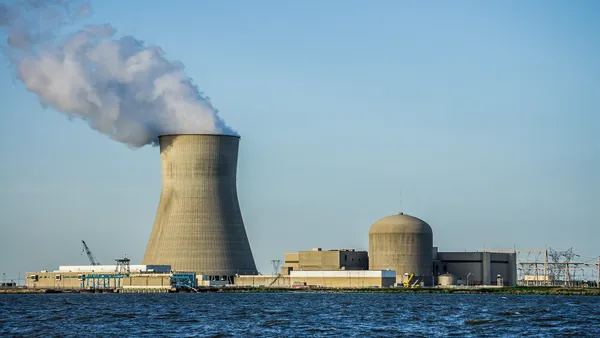Dive Brief:
-
The latest changes to Illinois’ massive and comprehensive energy legislation has won over some environmental advocates who previously opposed it.
-
The bill, SB 2814, has won support from the Sierra Club, the Natural Resources Dense Council and the Environmental Defense Fund, among others.
-
The BEST Coalition, which represents a variety of business, government and consumer groups, remains opposed to the bill, citing what it says would be higher power costs.
- The bill was voted out of the House energy committee on Tuesday and faces a vote on the House floor on Wednesday before moving on to the Senate.
Dive Insight:
Exelon's Illinois power legislation has a long and complicated history.
The six-day legislative session that concludes Thursday marks the company's third major push for a measure to support its nuclear fleet, and the bill in current configuration has gone through at least 27 rounds of changes.
The most recent changes included removing a fixed resource adequacy plan (FRAP) that would have provided capacity payments for coal plants in the southern part of the state, as well as dropping a provision that would have ended retail rate net metering and one that would have mandated residential demand charges.
The number of microgrids Exelon's utility subsidiary Commonwealth Edison will be authorized to build in Chicago was also reduced from five to one. The company had pushed the projects ensure power reliability for critical infrastructure like hospitals and airports.
The heart of the bill is still intact — implementation of a zero emission credit (ZEC) program for Exelon’s Clinton and Quad Cities nuclear power plants. But a 10-year sunset provision has been added to the ZEC program, instead of the 10-year offtake contract originally proposed, and the nuclear plants would stay open for 10 years, instead of six, as previously envisioned.
The current version of the bill also revised the energy efficiency program, giving large industrial energy users the option of managing their own programs. The energy efficiency program has the single biggest price tag in the bill, at $7.7 billion.
That program was cited by several of the environmental organizations that have now thrown their support behind the bill. At a Tuesday press conference, Nick Magrisso. Midwest legislative director for the Natural Resources Defense Fund, voiced his “enthusiastic support” for the revised bill and said its energy efficiency program would result in net savings of $6 billion, bring more renewables to the states and provide a path to a low carbon future.
The bill will “kick start renewable energy” in Illinois, “which has been dormant,” Andrew Barbeau, a consultant for the Environmental Defense Fund, said at the same press conference. The bill will bring $12 billion to $15 billion in renewable energy capital investment to the state, he said.
Several of the bill’s new supporters cited the economic leverage of that will come from the energy efficiency measures. Every dollar spent will result in three dollars of benefits for ratepayers, David Kolata, executive director of the Citizens Utility Board, said. Like other supporters, he noted that the benefits are not limited to customers that adopt energy efficiency measures. By reducing demand, energy efficiency brings about lower wholesale power prices for all customers, they noted.
Exelon and its utility subsidiary, Commonwealth Edison, also applauded the revisions to the bill.
“By any objective analysis, the economic benefits of this legislation far outweigh the costs, and will give Illinois a significant advantage in maintaining competitive electric rates and competition for clean energy jobs,” Joe Dominguez, Exelon’s executive vice president for governmental and regulatory affairs and public policy, said in a statement.
But the bill still has its critics. “It would still be the largest rate hike in U.S. history at $13.3 Billion,” the BEST Coalition said in a statement, reiterating its previous stance. The bill would move energy efficiency from a utility pass-through to a profit center with 9.5% annual returns, says Dave Lundy a BEST spokesman.
The bill is scheduled to be voted on by the House on Wednesday before moving for a final vote in the Senate. The timing is important. The state’s General Assembly is in a shortened veto session that is scheduled to end Thursday.
“The bill's in position to move quickly," wrote a staffer in the office Sen. Robert Rita's (D), a bill sponsor. "If they get the bill to where it has enough support, it could pass the House and Senate in just a few hours if needed, but they could extend out to Thursday as well."













